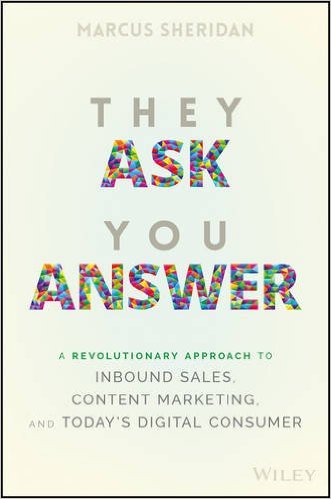Necessity is the mother of invention, as the proverb goes. And in 2008, Marcus Sheridan needed to improve business at River Pools and Spas. The economic downturn had crushed the pool business, and the company could no longer afford huge ad buys or traditional media. Faced with a looming crisis, Marcus turned to a new channel to drum up business: blogging.
Don't miss a MarketingProfs podcast, subscribe to our free newsletter!
He sat down at his kitchen table and typed the answer to every question he'd ever been asked about pools. Through content, Marcus transformed River Pools and Spas from a struggling small business into a thriving company. He also built the company site into the most-visited swimming pool website in the world.
When companies started asking how Marcus had turned River Pools around, he founded The Sales Lion—a sales, marketing, and personal development business—to help others master the content marketing approaches that had made River Pools so successful.
I invited Marcus to Marketing Smarts to discuss content tips from his new book They Ask, You Answer: A Revolutionary Approach to Inbound Sales, Content Marketing, and Today's Digital Consumer.
Here are just a few highlights from my conversation with Marcus:
Stop trying to hide your pricing (seriously) (06:10): "Here's where businesses go off the tracks. They say three reasons [for not disclosing pricing]. It doesn't matter what you do—B2B, B2C, service products, big/small, local/national, there are three reasons why [businesses] don't [disclose].
"The first reason is 'well, I have a very customized solution...every job is different, my prices vary, and I'm not selling a widget here.' The issue with that is very simple...If I came to you and I asked what would drive the cost of a project up, you would say 'I can explain that.' And if I came to you and I said what would keep the cost of a project down. You'd say, 'Sure, I can explain that.' And then if I came to you and asked...'Why are some [vendors] so expensive and some so cheap, and what is the difference between the expensive and the less expensive products or vendors in your marketplace,' and then again you'd be able to understand that. So that's the answer to it, 'it depends.'
"The second reason why we say we can't [disclose] is 'well, I don't want the competition to see my pricing.' What's funny about that is it's the big secret nonsecret. If I ask anybody worth their salt in business, 'Do you have a good sense of what the competition charges?' you would say 'yes.' And if you know what they charge, they also know what you charge. So we're trying to hide something from those that already [know]. And the competition doesn't pay our bills. We're more worried about giving the competition intel than we are about generating the trust of the people that actually give us money. It's nuts!
"And the third reason we justify that we can't...talk about cost and price is because we'll scare people away. In reality, the thing that scares [customers] away is not talking about it.... I'm not asking you to put a price list on your website, but the fact is that everybody wants to know what you're charging just like you want to know what they're charging when you research something.... You do need to explain the marketplace, and if you do, you're going to start to win trust and win traffic."
Use content to help your sales team address common questions (19:45): "I do a whole lot of sales training. Eighty percent of the questions that a salesperson gets in the first sales meeting are the same set of questions every single time. That's an average across the board, doesn't matter the industry.... So this is what's happening: We keep sending our salespeople into sales meetings to answer the exactly same questions over and over and over again. Why are we doing this? It doesn't make any sense.... We're not integrating content into the sales process."
B2B marketing is about trust—so is B2C, B2G, and every other kind of marketing (23:00): "The fundamentals of why people buy from [B2B companies] are the same as they would be in B2C or even B2G (business to government). There's one tie that binds all of us together as businesses.... If somebody trusts you more than they trusted everybody else, they'll give you their money. That's the tie that binds us together—trust. We're all in a battle of trust, B2B and B2C, service product, big/small, local/national. If we're trying to engender more trust, wouldn't solving problems and teaching and truly answering [people's] questions honestly and transparently better than anyone in your space...wouldn't that have value?"
To learn more, visit TheSalesLion.com or follow Marcus on Twitter @TheSalesLion, and be sure to get your copy of They Ask, You Answer: A Revolutionary Approach to Inbound Sales, Content Marketing, and Today's Digital Consumer.
Marcus and I talked about much more, including why he disagrees with the idea of content overload and how content marketing impacts much more than just search engine rankings, so be sure to listen to the entire show, which you can do above, or download the mp3 and listen at your convenience. Of course, you can also subscribe to the Marketing Smarts podcast in iTunes or via RSS and never miss an episode!
Music credit: Noam Weinstein.
...sign up for free to continue reading
Don't miss a MarketingProfs podcast, subscribe to our free newsletter!
Published on January 4, 2017







